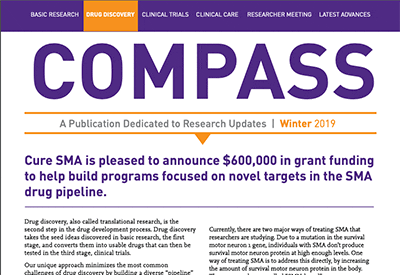On Wednesday, Congress passed the most sweeping tax bill in a generation. Cure SMA has been monitoring and advocating on your behalf as this legislation went through the Congress. We are happy to share that:
- Tax credits for rare disease drugs are saved. Cure SMA partnered with other rare disease groups to save a tax credit that supports rare disease drug development. Many new treatments would not be possible without this credit.
- Families can still deduct some medical expenses. Many in our community face significant health care expenses each year. This deduction remains in place, and will be expanded for the next two years.
- Charitable gift deductions will also remain in place. The tax reform bill introduces some changes that may impact charitable giving in the future. Cure SMA will continue to work closely with our donors and encouraging gifts to support research and family support services.
The tax reform bill also eliminated the Affordable Care Act’s individual mandate, which required the majority of Americans to have health insurance coverage or pay a penalty. The Affordable Care Act increased access to health insurance coverage for many Americans, a goal that is supported by Cure SMA. We continue to monitor Congressional proposals that may affect the SMA community and advocate on behalf of our community, in support of broad insurance coverage, better access to care and treatments, and more services to address the needs of individuals living with SMA. We are grateful for your partnership with us.
If you have questions about these issues please contact the Cure SMA policy and advocacy department at [email protected].
Tax Reform Bill FAQs
What is the Orphan Drug Tax Credit?
The Orphan Drug Tax Credit provides an incentive for pharmaceutical companies to seek treatments for rare diseases. Since the law’s enactment, 486 orphan products have been approved, more than 200 new orphan drugs have been approved by the Food and Drug Administration (FDA) –including Spinraza– compared with only 34 approved before enactment of the credit.
SMA drugs currently in clinical trials also benefit from this credit.
When will the tax reform measures go into effect?
Americans won’t need to worry about these changes when they file their 2017 tax returns in early 2018. The new laws will first be applied to 2018 taxes, which are filed in early 2019.
Does the Tax Reform Plan Repeal the Affordable Care Act (ACA)?
No. It only repeals the mandatory requirement that most Americans carry health insurance. Individuals who do not have employer insurance or public insurance are no longer required to purchase insurance through the individual market. The individual market is for Americans who don’t have access to employer coverage, but make too much money to qualify for safety net programs like Medicaid, or Americans who are self-employed.
What about people who rely on the ACA’s Individual Market?
The individual market is still available. The Congressional Budget Office estimates that, even though some people may opt not to purchase health insurance, the markets will remain stable in most of the country because the subsidies for people who buy insurance on the individual market are still in place.
What about the future of the Affordable Care Act (ACA) and other programs like the Children’s Health Insurance Program (CHIP) Medicaid?
Congress continues to consider proposals to stabilize the Affordable Care Act and Medicaid/Medicare. The Children’s Health Insurance Program (CHIP) expired September 30. Congress has been transferring some funding to states for the program, however; many states are already running out of funds and cutting and or decreasing enrollment. There is a chance that Congress will reauthorize CHIP before the end of the year, but most reports indicate that this will not occur until early next year.
Cure SMA continues to monitor these developments and educate Congress on the impact these proposals may have on the SMA community.
If you have questions about these issues please contact the Cure SMA policy and advocacy department at [email protected].



